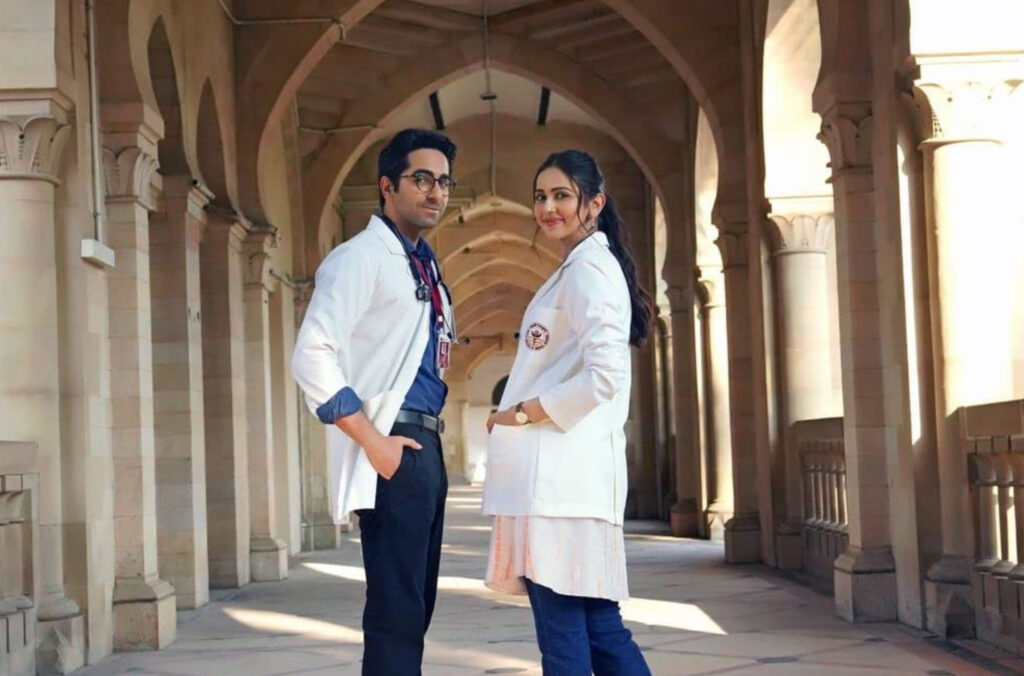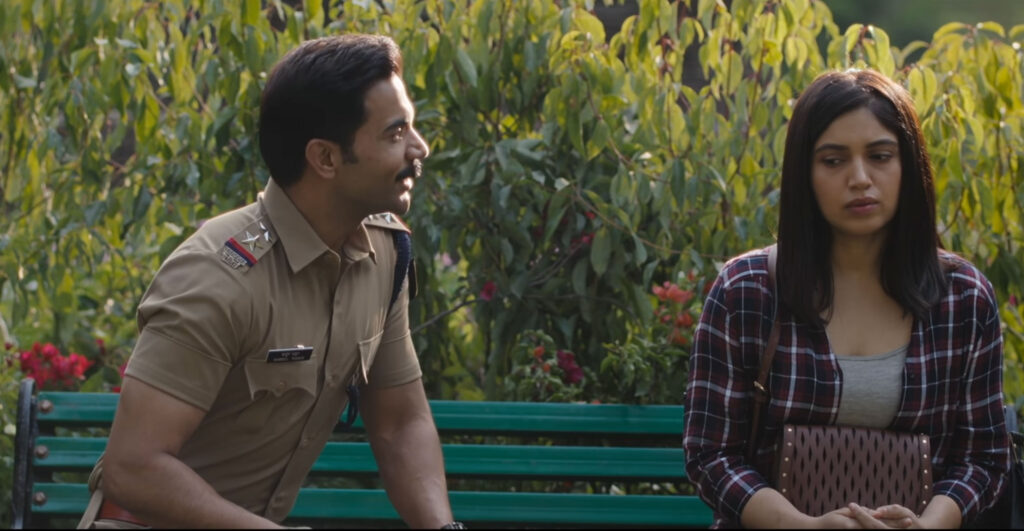November 1, 2022
by Carla Hay

Directed by Anubhuti Kashyap
Hindi with subtitles
Culture Representation: Taking place primarily in Bhopal, India, the comedy/drama film “Doctor G” features an all-Indian cast of characters representing the working-class and middle-class.
Culture Clash: A doctor wants his specialty to be orthopedics, but instead finds himself as the only man in an obstestrics/gynecology (OB/GYN) program, much to his dismay, because he thinks OB/GYN doctors should be mostly women.
Culture Audience: “Doctor G” will appeal primarily to people who like watching sufficiently entertaining movies about how men and women handle “the battle of the sexes,” even if some of the scenarios in these movies are a little far-fetched.

The mildly amusing film “Doctor G” pokes fun at the sexist idea that certain medical practices should be handled primarily by one gender. It’s a breezy comedy/drama that handles issues of gender equality in a somewhat predictable but entertaining way. The last third of the movie rushes in a lot of overly contrived plot developments, but the movie’s would-be romance doesn’t necessarily play into viewers’ expectations.
Directed by Anubhuti Kashyap, “Doctor G” is a combination of slapstick comedy, musical numbers and emotional drama. The mixture doesn’t always flow smoothly, but when it works, it works well enough to keep viewers engaged in the characters and the story. The “Doctor G” screenplay was co-written by Kashyap, Saurabh Bharat, Sumit Saxena and Vishal Wagh.
The title character of “Doctor G” (and the movie’s protagonist) is Dr. Uday “Gudda” Gupta (played by Ayushmann Khurrana), a medical school graduate, who is about to continue his medical training at the Bhopal Institute of Medical Sciences in Bhopal, India. Uday has had a longtime goal of being an orthopedic doctor. However, he finds out that the Bhopal Institute has rejected his application in the orthopedic program because his entrance exam’s test scores weren’t high enough.
Instead, he is offered a spot in the Bhopal Institute’s gynecology program—and he’s not happy about it at all. “I can’t treat body parts I don’t have,” Uday whines. (In India, the OB/GYN medical practice is often generally referred to as gynecology.) Uday finds out that another medical school graduate named Priyanka Singh (played by Sharvari Deshpande) got accepted into the Bhopal Institute’s orthopedic program.
Uday thinks that women, not men, should be OB/GYN doctors, so he approaches Priyanka and asks her to switch her orthopedic program enrollment with his at the OB/GYN enrollment program. Priyanka adamantly refuses, because she says she earned her place in the orthopedic program, and she’s not going to give up this opportunity for anyone. Around the same time that Uday gets this news, his girlfriend Ruchi (played by Karishma Singh), who was in the same graduating class at the medical school, breaks up with him.
Needless to say, bitter and rejected Uday doesn’t have the highest opinion of women at this point in his life. In the movie’s opening scene, he is shown talking with his best friend Abhishek “Chaddi” Chandel (played by Abhay Chintamani Mishr) about what he thinks should be the social constructs of dating. Uday firmly believes that men and women who only platonically date each other are just wasting their time. Uday thinks that people who date each other for a certain period of time might has well eventually have sex with each other.
Throughout most of the movie, Uday shows that he doesn’t hate women but that he has a very sexist mindset, where he believes in strict gender roles on what men and women can and cannot do with their careers. The movie doesn’t really explain where he got this attitude. Uday’s widowed mother Shobha Gupta (played by Sheeba Chaddha) is sassy and independent-minded. She does cooking videos on social media, with the hope that she will become a social media star for her cooking. Uday sometimes gets embarrassed when his mother hints that she wants to spice up her love life by getting back into the dating scene.
Uday has a distant cousin named Dr. Ashok Gupta (played by Indraneil Sengupta), who is an orthopedic surgeon. Uday admires Ashok and thinks of him as a brotherly mentor. And so, Uday asks Ashok for advice on what to do about enrolling in Bhopal Institute of Medical Sciences as an OB/GYN trainee. Ashok suggests that Uday enroll in the program and apply to transfer to the orthopedic program when the time is right.
Ashok is a married father in his 40s, but he has a creepy fascination with a 17-year-old girl named Kavya Sharma (played by Ayesha Kaduskar), whom Ashok introduces to Uday as a “friend.” Considering how much Ashok and Kavya hang out with each other and flirt with each other, it would make any person with common sense start to wonder if Ashok and Kavya are really “just friends.” A few plot developments in the movie eventually address this inappropriate relationship.
Uday’s enrollment in the OB/GYN program doesn’t get off to a great start. He begins the program 10 days after classes have started for the semester. And so, he’s already not made a good impression on Dr. Nandini Srivastav (played by the Shefali Shah), the no-nonsense head of the institute’s gynecology department. Uday, who is already insecure about women, is in for a shock when he finds out that he’s the only man in the gynecology program.
This huge gender imbalance is the most unrealistic part of the movie, because men (especially in patriarchal countries such as India) typically have had more access and resources to go to medical school and become doctors. Therefore, in most countries, most OB/GYN doctors are men. As more women become doctors, there are some places that are closing the gender gap, but men in a lot of cultures typically get more encouragement and privileges than women to become doctors.
The contrivance of Uday being the only man in his gynecology training is used for numerous comedic scenarios that are intended to humble Uday and make him see the error of his sexist ways. Many of the women haze him and pull pranks on him, since he’s the late newcomer to the program. He’s forced to do things so that he can understand a female point of view, such as wear a skirt or pretend that he’s a woman about to give birth.
Meanwhile, one of the program’s brightest students is Dr. Fatima Siddiqui (played by Rakul Preet Singh), who is a year or two ahead of Uday in the program. Fatima is a confident extrovert. Fatima’s best friend at the institute is Dr. Kumudlatha Pamulparthi Diwakaran (played by Shraddha Jain), who likes people to call her KLPD as a nickname. Fatima and KLPD, who like to tease Uday about his discomfort in being the institute’s gynecology program, have their own nickname for him: Dr. Nipples.
As Uday spends more time with Fatima, he becomes more attracted to her, and the feeling might be mutual. However, there’s a big obstacle to this possible romance: Fatima is engaged to marry another man named Arif Qureshi (played by Paresh Pahuja) in a love match, not an arranged marriage. Meanwhile, Uday experiences some highs and lows on the job as an OB/GYN trainee. He predictably clashes with Dr. Srivastav, who tells Uday at one point to “lose his male touch”—in other words, stop being a male chauvinist.
“Doctor G” can at times be melodramatic but then clumsily transition to a lighthearted musical number or a comedic scene to lighten the mood. All of the actors handle their roles with skill, but there’s nothing particularly outstanding about their performances. The movie falls into some “love triangle” stereotypes in some ways, while in other ways, there some expected surprises.
Those surprises are what make “Doctor G” slightly better than the average movie of this type. It’s expected that Uday will have a personal transformation. But the challenge of the movie is to make that transformation look authentic. In that respect, “Doctor G” succeeds enough for it to be an enjoyable diversion for viewers who want to watch a relatively lightweight movie about how men and women can respectfully learn from each other.
Viacom18 Studios released “Doctor G” in select U.S. cinemas and in India on October 14, 2022.


